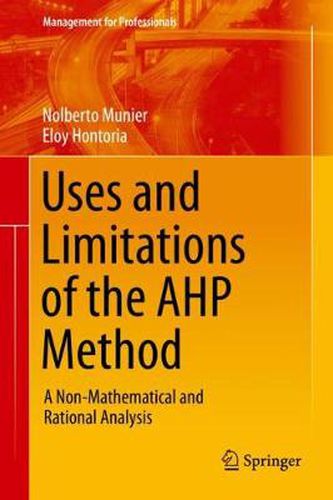Readings Newsletter
Become a Readings Member to make your shopping experience even easier.
Sign in or sign up for free!
You’re not far away from qualifying for FREE standard shipping within Australia
You’ve qualified for FREE standard shipping within Australia
The cart is loading…






This title is printed to order. This book may have been self-published. If so, we cannot guarantee the quality of the content. In the main most books will have gone through the editing process however some may not. We therefore suggest that you be aware of this before ordering this book. If in doubt check either the author or publisher’s details as we are unable to accept any returns unless they are faulty. Please contact us if you have any questions.
This book examines the Analytical Hierarchy Process (AHP) method, its varied uses, as well as its limitations for solving real-world scenarios. While the simplicity of the method compels users to find shortcuts to a real-world problem, it also leads to obtaining wrong results that do not represent reality. By alerting practitioners about the core necessities of a new scenario, this book helps solve this problem, as well as contribute to the field of Multicriteria Decision Making Method (MDCM).
The authors use a demonstrative, rather than a theoretical approach, and examine 30 subjects that displays the shortcomings and drawbacks of the AHP. Each one is examined in-depth, discussed, debated and reasoned, using examples, some of them numeric. The book highlights the rationality and common sense of the subjects, and in most cases, validates the criticism by showing through numerical examples, the impossibility of the AHP method to address, let alone solve real-world projects. At the conclusion of each subject, a table is built comparing the similarities and differences between the opinions of the authors and other experts, along with the respective pros and cons.
$9.00 standard shipping within Australia
FREE standard shipping within Australia for orders over $100.00
Express & International shipping calculated at checkout
Stock availability can be subject to change without notice. We recommend calling the shop or contacting our online team to check availability of low stock items. Please see our Shopping Online page for more details.
This title is printed to order. This book may have been self-published. If so, we cannot guarantee the quality of the content. In the main most books will have gone through the editing process however some may not. We therefore suggest that you be aware of this before ordering this book. If in doubt check either the author or publisher’s details as we are unable to accept any returns unless they are faulty. Please contact us if you have any questions.
This book examines the Analytical Hierarchy Process (AHP) method, its varied uses, as well as its limitations for solving real-world scenarios. While the simplicity of the method compels users to find shortcuts to a real-world problem, it also leads to obtaining wrong results that do not represent reality. By alerting practitioners about the core necessities of a new scenario, this book helps solve this problem, as well as contribute to the field of Multicriteria Decision Making Method (MDCM).
The authors use a demonstrative, rather than a theoretical approach, and examine 30 subjects that displays the shortcomings and drawbacks of the AHP. Each one is examined in-depth, discussed, debated and reasoned, using examples, some of them numeric. The book highlights the rationality and common sense of the subjects, and in most cases, validates the criticism by showing through numerical examples, the impossibility of the AHP method to address, let alone solve real-world projects. At the conclusion of each subject, a table is built comparing the similarities and differences between the opinions of the authors and other experts, along with the respective pros and cons.